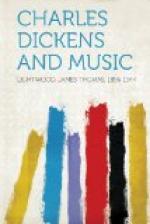Now’s the day, and now’s
the hour,
See the front o’ battle
lour,
See approach proud Edward’s
power,
Chains
and slaverie.
OF ALL THE GIRLS THAT ARE SO SMART (O.C.S. 50)
Words and music by Henry Carey.
Carey composed his melody in 1715. It soon became popular, but owing to the similarity of certain phrases to those of an older tune known as ‘The Country Lass,’ the two gradually got mixed up, with the result that the latter became the recognized setting.
OFF SHE GOES (S.B.T. 7)
A once popular dance air.
OFT IN THE STILLY NIGHT (S.B.S. 13)
From T. Moore’s National Airs, set to
an air possibly of
Scotch origin. There are also settings by Stevenson
and Hullah.
OH BLAME NOT THE BARD (O.C.S. 35)
Words by T. Moore.
In Irish Melodies. Set to the tune ‘Kitty Tyrrel.’
OH GIVE ME BUT MY ARAB STEED (O.C.S. 21)
Words by T.H. Bayly. G.A. Hodson.
Written in 1828. Sung by Braham.
Oh give me but my Arab steed,
My prince defends
his right,
And I will to the battle speed,
To guard him in
the fight.
OH CHEERILY, CHEERILY (D. & S. 32)
Original, but a refrain similar to this is not uncommon in old sea songs.
OH LADY FAIR (G.E. 13)
Trio by Moore.
See ‘Strew then, O strew.’
OH LET US LOVE OUR OCCUPATIONS (Ch.)
Original lines by Dickens. ‘Set to music on the new system,’ probably refers to Hullah’s method (c. 1841), or possibly the Tonic Sol-fa (c. 1843), see p. 17.
OH LANDSMEN ARE FOLLY (H.R.)
Original.
OLD CLEM (G.E. 12, 15)
A custom prevailed at Chatham of holding a procession on St. Clement’s day, and the saint, who was irreverently designated ‘Old Clem,’ was personated by a young smith disguised for the occasion.
Dickens frequently writes a verse in the form of prose, and this is an example. Written out properly, it reads thus:
Hammer boys round—Old
Clem,
With a thump and a sound—Old
Clem,
Beat it out, beat it out—Old
Clem,
With a cluck for the stout—Old
Clem,
Blow the fire, blow the fire—Old
Clem,
Roaring drier, soaring higher—Old
Clem.




